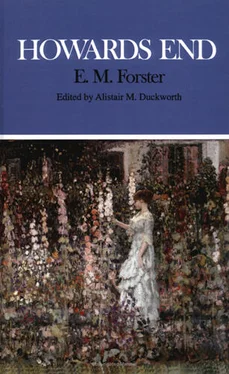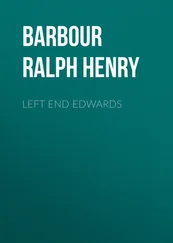Edward Morgan Forster - Howards End
Здесь есть возможность читать онлайн «Edward Morgan Forster - Howards End» весь текст электронной книги совершенно бесплатно (целиком полную версию без сокращений). В некоторых случаях можно слушать аудио, скачать через торрент в формате fb2 и присутствует краткое содержание. Жанр: Классическая проза, на английском языке. Описание произведения, (предисловие) а так же отзывы посетителей доступны на портале библиотеки ЛибКат.
- Название:Howards End
- Автор:
- Жанр:
- Год:неизвестен
- ISBN:нет данных
- Рейтинг книги:3 / 5. Голосов: 1
-
Избранное:Добавить в избранное
- Отзывы:
-
Ваша оценка:
- 60
- 1
- 2
- 3
- 4
- 5
Howards End: краткое содержание, описание и аннотация
Предлагаем к чтению аннотацию, описание, краткое содержание или предисловие (зависит от того, что написал сам автор книги «Howards End»). Если вы не нашли необходимую информацию о книге — напишите в комментариях, мы постараемся отыскать её.
Howards End — читать онлайн бесплатно полную книгу (весь текст) целиком
Ниже представлен текст книги, разбитый по страницам. Система сохранения места последней прочитанной страницы, позволяет с удобством читать онлайн бесплатно книгу «Howards End», без необходимости каждый раз заново искать на чём Вы остановились. Поставьте закладку, и сможете в любой момент перейти на страницу, на которой закончили чтение.
Интервал:
Закладка:
But he was thinking the snub quite natural. Everything she did was natural, and incapable of causing offence. While the Miss Schlegels were together he had felt them scarcely human—a sort of admonitory whirligig. But a Miss Schlegel alone was different. She was in Helen's case unmarried, in Margaret's about to be married, in neither case an echo of her sister. A light had fallen at last into this rich upper world, and he saw that it was full of men and women, some of whom were more friendly to him than others. Helen had become "his" Miss Schlegel, who scolded him and corresponded with him, and had swept down yesterday with grateful vehemence. Margaret, though not unkind, was severe and remote. He would not presume to help her, for instance. He had never liked her, and began to think that his original impression was true, and that her sister did not like her either. Helen was certainly lonely. She, who gave away so much, was receiving too little. Leonard was pleased to think that he could spare her vexation by holding his tongue and concealing what he knew about Mr. Wilcox. Jacky had announced her discovery when he fetched her from the lawn. After the first shock, he did not mind for himself. By now he had no illusions about his wife, and this was only one new stain on the face of a love that had never been pure. To keep perfection perfect, that should be his ideal, if the future gave him time to have ideals. Helen, and Margaret for Helen's sake, must not know.
Helen disconcerted him by fuming the conversation to his wife. "Mrs. Bast—does she ever say 'I'?" she asked, half mischievously, and then, "Is she very tired?"
"It's better she stops in her room," said Leonard.
"Shall I sit up with her?"
"No, thank you; she does not need company."
"Mr. Bast, what kind of woman is your wife?"
Leonard blushed up to his eyes.
"You ought to know my ways by now. Does that question offend you?"
"No, oh no, Miss Schlegel, no."
"Because I love honesty. Don't pretend your marriage has been a happy one. You and she can have nothing in common."
He did not deny it, but said shyly: "I suppose that's pretty obvious; but Jacky never meant to do anybody any harm. When things went wrong, or I heard things, I used to think it was her fault, but, looking back, it's more mine. I needn't have married her, but as I have I must stick to her and keep her."
"How long have you been married?"
"Nearly three years."
"What did your people say?"
"They will not have anything to do with us. They had a sort of family council when they heard I was married, and cut us off altogether."
Helen began to pace up and down the room. "My good boy, what a mess!" she said gently. "Who are your people?"
He could answer this. His parents, who were dead, had been in trade; his sisters had married commercial travellers; his brother was a lay-reader.
"And your grandparents?"
Leonard told her a secret that he had held shameful up to now. "They were just nothing at all," he said, "—agricultural labourers and that sort."
"So! From which part?"
"Lincolnshire mostly, but my mother's father—he, oddly enough, came from these parts round here."
"From this very Shropshire. Yes, that is odd. My mother's people were Lancashire. But why do your brother and your sisters object to Mrs. Bast?"
"Oh, I don't know."
"Excuse me, you do know. I am not a baby. I can bear anything you tell me, and the more you tell the more I shall be able to help. Have they heard anything against her?"
He was silent.
"I think I have guessed now," said Helen very gravely.
"I don't think so, Miss Schlegel; I hope not."
"We must be honest, even over these things. I have guessed. I am frightfully, dreadfully sorry, but it does not make the least difference to me. I shall feel just the same to both of you. I blame, not your wife for these things, but men."
Leonard left it at that—so long as she did not guess the man. She stood at the window and slowly pulled up the blinds. The hotel looked over a dark square. The mists had begun. When she turned back to him her eyes were shining.
"Don't you worry," he pleaded. "I can't bear that. We shall be all right if I get work. If I could only get work—something regular to do. Then it wouldn't be so bad again. I don't trouble after books as I used. I can imagine that with regular work we should settle down again. It stops one thinking. "
"Settle down to what?"
"Oh, just settle down."
"And that's to be life!" said Helen, with a catch in her throat. "How can you, with all the beautiful things to see and do—with music—with walking at night—"
"Walking is well enough when a man's in work," he answered. "Oh, I did talk a lot of nonsense once, but there's nothing like a bailiff in the house to drive it out of you. When I saw him fingering my Ruskins and Stevensons, I seemed to see life straight real, and it isn't a pretty sight. My books are back again, thanks to you, but they'll never be the same to me again, and I shan't ever again think night in the woods is wonderful."
"Why not?" asked Helen, throwing up the window.
"Because I see one must have money."
"Well, you're wrong."
"I wish I was wrong, but—the clergyman—he has money of his own, or else he's paid; the poet or the musician—just the same; the tramp—he's no different. The tramp goes to the workhouse in the end, and is paid for with other people's money. Miss Schlegel, the real thing's money and all the rest is a dream."
"You're still wrong. You've forgotten Death."
Leonard could not understand.
"If we lived for ever what you say would be true. But we have to die, we have to leave life presently. Injustice and greed would be the real thing if we lived for ever. As it is, we must hold to other things, because Death is coming. I love Death—not morbidly, but because He explains. He shows me the emptiness of Money. Death and Money are the eternal foes. Not Death and Life. Never mind what lies behind Death, Mr. Bast, but be sure that the poet and the musician and the tramp will be happier in it than the man who has never learnt to say, 'I am I.'"
"I wonder."
"We are all in a mist—I know but I can help you this far—men like the Wilcoxes are deeper in the mist than any. Sane, sound Englishmen! building up empires, levelling all the world into what they call common sense. But mention Death to them and they're offended, because Death's really Imperial, and He cries out against them for ever."
"I am as afraid of Death as any one."
"But not of the idea of Death."
"But what is the difference?"
"Infinite difference," said Helen, more gravely than before.
Leonard looked at her wondering, and had the sense of great things sweeping out of the shrouded night. But he could not receive them, because his heart was still full of little things. As the lost umbrella had spoilt the concert at Queen's Hall, so the lost situation was obscuring the diviner harmonies now. Death, Life and Materialism were fine words, but would Mr. Wilcox take him on as a clerk? Talk as one would, Mr. Wilcox was king of this world, the superman, with his own morality, whose head remained in the clouds.
"I must be stupid," he said apologetically.
While to Helen the paradox became clearer and clearer. "Death destroys a man: the idea of Death saves him." Behind the coffins and the skeletons that stay the vulgar mind lies something so immense that all that is great in us responds to it. Men of the world may recoil from the charnel-house that they will one day enter, but Love knows better. Death is his foe, but his peer, and in their age-long struggle the thews of Love have been strengthened, and his vision cleared, until there is no one who can stand against him.
"So never give in," continued the girl, and restated again and again the vague yet convincing plea that the Invisible lodges against the Visible. Her excitement grew as she tried to cut the rope that fastened Leonard to the earth. Woven of bitter experience, it resisted her. Presently the waitress entered and gave her a letter from Margaret. Another note, addressed to Leonard, was inside. They read them, listening to the murmurings of the river.
Читать дальшеИнтервал:
Закладка:
Похожие книги на «Howards End»
Представляем Вашему вниманию похожие книги на «Howards End» списком для выбора. Мы отобрали схожую по названию и смыслу литературу в надежде предоставить читателям больше вариантов отыскать новые, интересные, ещё непрочитанные произведения.
Обсуждение, отзывы о книге «Howards End» и просто собственные мнения читателей. Оставьте ваши комментарии, напишите, что Вы думаете о произведении, его смысле или главных героях. Укажите что конкретно понравилось, а что нет, и почему Вы так считаете.












